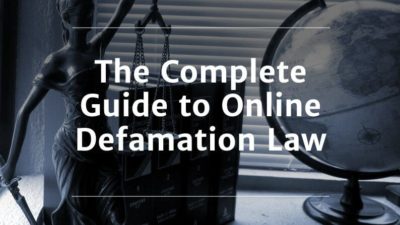
How to Remove Defamatory Posts From Scamity.com
This page has been peer-reviewed, fact-checked, and edited by qualified attorneys to ensure substantive accuracy and coverage.
The Basics: What is Scamity.com?
Formerly known as ScamOrg.com, Scamity.com is an online user-generated content platform and website for users to report scam products, scam businesses, and various other scams. The homepage is simple, boasting a mysterious and faceless figure dawning sunglasses, calling users to “report a scam” via their big red “Report Scam” button. Scamity and ScamOrg.com both rank/ranked highly in search engine results, putting you and your business’s reputation in danger.
Scamity.com, along with countless other user-generated content platforms, takes a relatively bare form. 1 star reviews are scattered across the homepage, and categorized alphabetically, allowing for easy use and minimal confusion.
Like WebActivism, their site dishes on scams and hustles ranging from estate sales services, to lawyers and doctors, all the way to study abroad fraud. For a list of comprehensive and common scams and frauds you should be on the lookout for, check out the Federal Trade Commission’s website and US.gov. Real fraud and scams should not be reported on an unregulated and unverifiable online bulletin board, but should be brought directly to the relevant consumer authorities.
Defamation Removal Tip: The party who defames another by publishing a false statement of fact damaging a person’s reputation is often referred to as a defamer, libeler, slanderer, or famacide.
If you or your business has gotten a bad review on Scamity.com, or similar scam reporting websites like DirtyScam and PissedConsumer, it’s imperative you reach out to an experienced internet defamation attorney to secure a permanent takedown today!
The Minc Law team of experienced defamation removal lawyers boast a near 100% removal rate, and all for a flat, reasonable fee. To schedule a free, initial no-obligation consultation with an intake specialist, call us at (216) 373-7706, or schedule a meeting online by filling out our online contact form.
With a team of experienced attorneys, we will fight for the closure you deserve. Take back control today.Don't suffer in silence.
We want to fight for your reputation
Defamation Law Fact: The legal principle of defamation per se classifies certain statements as so inherently defamatory, that the plaintiff doesn’t need to prove actual damages (a key requirement when bringing a successful defamation claim). Such statements include false statements accusing someone of engaging in criminal activity, possessing a loathsome disease (STD or leprosy), acting unchaste and sexually promiscuous, or behaving incompatibly with the conduct required of a business, trade, or profession.
Why Scamity.com Poses a Serious Threat to Your Business’s Reputation & Livelihood
Scamity.com and other scam reporting websites all take a similar shape and form, often appearing as a user-generated content platform, and most commonly, as an online bulletin board. Although you may not be familiar with the term user-generated content platform, they are all over the Internet, and you’ve most certainly used and contributed to one in your Web-tenure.
User-generated content platforms and websites most commonly manifest themselves in the form of:
- Social media sites,
- Blogs,
- Wikis,
- Video uploading websites and services, such as YouTube,
- E-commerce, and
- Online bulletin boards and forums.
User-generated content websites do democratize content creation, allowing for more original, accessible, and user-friendly online content, but do suffer from several serious flaws. Scamity.com is ripe with user protections and safeguards, allowing anyone to post malicious attacks and defame businesses and professionals.
Ohio Defamation Law Examples: Some examples of slander per se in Ohio include: (1) a letter alleging a company’s workers were “unprofessional” and had engaged in voyeurism, (2) statements asserting a plaintiff was “convicted of a felony,” and (3) accusations of a husband viewing child pornography. Ohio’s statute of limitations requires plaintiffs bring their defamation claim within one (1) year of when the “cause of action accrued,” also known as the time the plaintiff first discovers the injury.
3 Key Reasons Why Scamity.com Poses a Threat to Your Business’s Reputation
- Anonymity: Scamity.com is a safe-haven for anonymous users to post complaints and false reviews about businesses and professionals. Even the most basic of user-generated content platforms require users to sign-up with an email address, but Scamity foregoes such protective measure. Due to Scamity’s lack of such basic controls and regulations, users are unrestrained and the likelihood of online defamation and false attacks increases due to the perceived invincibility felt by posters. Anonymous posting leaves injured parties will no apparent recourse, and deters them from bringing forth a defamation claim.
- Unregulated content: When users aren’t required to give so much as their name or email address, what’s stopping them from completely fabricating a story or review? Nothing. Posters may anonymously post complaints about businesses, services, and professionals with little to no supporting evidence. Additionally, Scamity.com recognizes its near-blanket immunity as a user-generated content platform and takes a hands-off approach to content regulation and moderation. Leaving users to police themselves results in most online bulletin boards and scam reporting websites being no more structured and organized than a meeting in Lord of the Flies.
- Vague and near non-existent removal policy: Scamity possesses extremely bare and vague contact information and procedures in case of online defamation and other offensive content. Their Terms of Service only acknowledges copyright infringement as an effective means of removing content, and omits any channel of recourse for users falsely posted about or accused.
Online Libel Removal Tip: Before bringing an action for online libel removal, it’s important to understand the possible defenses a defendant may have to your libel claim. The most common defenses to libel actions include: (1) truth, (2) opinion, (3) consent, and (4) privilege. Some less common defenses include fair comment on a matter of public interest, innocent dissemination, and no actual injury.
Don’t let your next employer, best-friend, or current loved-one find such malicious and defamatory posts about you online, and act today. Call Minc Law at (216) 373-7706 to schedule a free, no-obligation initial consultation with an intake specialist, or schedule a meeting online.
At Minc Law, we use all available takedown tactics and will work with Google and other search engines to secure a swift and permanent removal and hold online defamers liable. We also are able to remove fake Google reviews as well! Don’t hesitate, and reach out today.
The Effects of Online Defamation on Your Business and Reputation
Below is a list of just some of the serious consequences online defamation can have on your business and career.
| Decreased bottom line | Online defamation will ultimately have a significant impact on you or your business’s bottom line, due to negative press, loss of customers, and loss of partnerships and advertising. |
| Loss of existing and future business partnerships | Contractors, consultants, or other professionals and businesses may choose to sever ties due to negative implications of being associated with you or your business. |
| Loss of existing and future customers | Loyal customers may determine you or your business’s values don’t align with theirs and choose one of your competitors instead. |
| Wrongful denial of future employment opportunities | Employers could write you off completely, rejecting your application outright, not even allowing you to get a foot in the door. |
| Revocation of sponsors or advertising | No business or brand wants to be associated with unsavory and unprofessional behavior, something Tiger Woods knows all too well. |
| Heightened scrutiny by community and media | One bad review could lead to further investigations by media outlets and journalists, causing them to pick apart your business and broadcast it to the community...and world. |
| Going out of business | Ultimately, all of the above factors could make it hard to stay afloat, resulting in you or your business having to close your doors for good. |
Defamation Law Fact: Defamation per quod is the opposite of defamation per se, and exists when there is no apparent injury or harm to a plaintiff’s reputation. Defamation per quod requires a plaintiff provide additional evidence to prove monetary or general damages, while defamation per se presumes a plaintiff suffered “special damages.”
To schedule a free, initial no-obligation consultation with an intake specialist, call us at (216) 373-7706, or fill out our online contact form today. At Minc Law, we boast a nearly 100% removal rate, and all for a reasonable, flat fee.
Call the Ohio Reputation Lawyers of Minc Law today! We will fight tooth and nail to remove defamatory content from Scamity.com and other toxic online bulletin boards.
Can I Hold Scamity.com Liable for Online Defamation & False Posts?
Unfortunately, you can’t hold Scamity.com liable for online defamation and false posts.
Scamity.com, and other user-generated content websites are protected under a piece of controversial Internet legislation, titled the Communications Decency Act of 1996 (CDA). Specifically, Section 230 of the Communications Decency Act only allows users to hold user-generated content websites and platforms liable where the website was actively engaged in creating, editing, or curating the content.
The protection granted to websites under the CDA is similar to that of a telephone company. Although threats, attacks, and unsavory things are said via their phone lines daily, they aren’t actually responsible for the damage caused. User-generated content platforms merely provide the grounds and framework for users to go to battle online.
For an easy-to-understand explanation of Section 230 and why sites like Scamity.com are often protected from liability under the legislation, check out the video below. In the video, we provide a basic overview of Section 230, and explain who you CAN hold liable for defamatory or harassing online behavior.
Video: What is Section 230 of the Communications Decency Act?

Reputation Repair Lawyer Tip: If you want to minimize or bury a negative digital footprint caused by a false or malicious review, there are several easy and free steps you can take to suppress it in Google’s search results: (1) create and establish a social media presence, (2) respond directly to negative reviews and posts, (3) start a blog and regularly post, (4) linking between various online profiles and authoritative websites, (5) avoid getting in online arguments and worsening the situation. Following the above five tips will help improve your SEO and online presence by establishing a positive digital footprint that outweighs false and unsubstantiated attacks on unregulated bulletin boards.
User-generated content platform immunity has been upheld in several notable legal cases, including:
Zeran v. AOL
Zeran v. AOL hinged on several malicious and offensive comments posted on AOL’s “Michigan Military Movement” bulletin board six days after the Oklahoma City bombing. All comments included a message including Kenneth M. Zeran’s name, invoking users call him to purchase offensive advertising items and slogans.
Although AOL unreasonably delayed in removing the malicious defamatory messages and failed to properly screen for similar posts, they were protected under the CDA, due to the Congress’ clear objective of promoting third-party distributors of information.
Blumenthal v. Drudge
In 1998, online service provider and instant messaging platform, AOL, and journalist, Matthew Nathan Drudge, tangled in the online defamation arena after Drudge published several malicious attacks against Clinton aid, Sidney Blumenthal, accusing Blumenthal had abused his spouse, Jacqueline. Because Drudge had published the attacks on AOL, they were also named as a defendant to the suit by Blumenthal.
Ultimately, a D.C. court upheld AOL’s immunity under the CDA due to Drudge acting as the actual creator of content. And, although AOL had an aggressive and active role in monitoring content, it would uproot public policy by holding a neutral third-party platform liable for libel when they weren’t the actual creators.
Work With an Experienced Content Removal Attorney Today!
If you or your business have been unfairly attacked, defamed, or cyberbullied on Scamity.com, and you would like it removed immediately, call the Reputation Lawyers of Minc Law today! The Minc Law team of highly-trained defamation removal lawyers know who to contact in order to secure a swift and effective takedown.
We use all available tactics and resources to remove libel and online defamation from the Internet, including confronting the malicious posters and holding them directly accountable. Additionally, we will work closely with content managers, third-party arbitration services, and site administrators to pursue the most practical and effective takedown method.
And, if all else fails, we will seek a court-ordered removal.
When dealing with online defamation, time is of the essence, so call us at (216) 373-7706, or contact us online to schedule a free, no-obligation initial consultation with an intake specialist.
★★★★★
“Content was removed in under 5 days. Honestly I was prepared to get my money back as some of these websites state it is impossible to move the data. However, I was happy to get the information removed. A little expensive but money well spent for peace of mind…”
TS, February 18, 2020


![The Importance of Online Reviews: 50+ Key Statistics to Know [2020] featured image](https://www.minclaw.com/wp-content/uploads/2020/08/online-review-statistics-2020-400x0-c-default.jpg)
